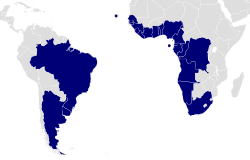The South Atlantic Peace and Cooperation Zone (abbreviations: ZPCAS or ZOPACAS; Spanish: Zona de Paz y Cooperación del Atlántico Sur; Portuguese: Zona de Paz e Cooperação do Atlântico Sul; also called the Zone of Peace and Cooperation of the South Atlantic) was created in 1986 through resolution A/RES/41/11 of the U.N. general assembly on Brazil's initiative, with the aim of promoting cooperation and the maintenance of peace and security in the South Atlantic region. Particular attention was dedicated to the question of preventing the geographical proliferation of nuclear weapons and of reducing and eventually eliminating the military presence of countries from other regions.
 Flag of the ZPCAS | |
 Member countries shown in blue | |
| Formation | 27 October 1986 |
|---|---|
| Headquarters | Brasília, Brazil |
Membership | 24 member states |
Official language | English, Portuguese, Spanish, French |
Secretary General | H.E.Luiz Inácio Lula da Silva [1] |

A Declaration on the denuclearization of the South Atlantic region was adopted at a meeting of member states held in Brasilia in September 1994. The U.N. General Assembly endorsed the initiative, albeit with opposition from the United States, United Kingdom and France.[2]
The South Atlantic itself is currently not a nuclear-weapon-free zone but all member states are currently signatories of international treaties that prohibit nuclear weapons, namely the African Nuclear Weapons Free Zone Treaty and the Treaty for the Prohibition of Nuclear Weapons in Latin America and the Caribbean. However, several Mid-Atlantic Ridge islands, the British overseas territory of Saint Helena and its dependencies Ascension Island and Tristan da Cunha, and Norway's Bouvet Island are not covered by those treaties. In addition, the Falkland Islands are not covered by these treaties as a British Overseas Territory.
Members
| Country | Continent |
|---|---|
 Angola Angola | Africa |
 Argentina Argentina | Americas |
 Benin Benin | Africa |
 Brazil Brazil | Americas |
 Cabo Verde Cabo Verde | Africa |
 Cameroon Cameroon | Africa |
 Congo Congo | Africa |
 Democratic Republic of the Congo Democratic Republic of the Congo | Africa |
 Equatorial Guinea Equatorial Guinea | Africa |
 Gabon Gabon | Africa |
 Gambia Gambia | Africa |
 Ghana Ghana | Africa |
 Guinea Guinea | Africa |
 Guinea Bissau Guinea Bissau | Africa |
 Ivory Coast Ivory Coast | Africa |
 Liberia Liberia | Africa |
 Namibia Namibia | Africa |
 Nigeria Nigeria | Africa |
 Sao Tome and Principe Sao Tome and Principe | Africa |
 Senegal Senegal | Africa |
 Sierra Leone Sierra Leone | Africa |
 South Africa South Africa | Africa |
 Togo Togo | Africa |
 Uruguay Uruguay | Americas |
See also
References
- Address to the 6th Ministerial Meeting of the Zone for Peace and Cooperation in the South Atlantic (Dept. of Foreign Affairs of South Africa)
- United Nations General Assembly Resolution A/RES/41/11 - Zone of Peace and Cooperation of the South Atlantic
- Voting record on this resolution 41/11
- South African-Latin American Maritime Co-operation: Towards a South Atlantic RIM Community? Written by Dr. Greg Mills, National Director, South African Institute of International Affairs, Johannesburg